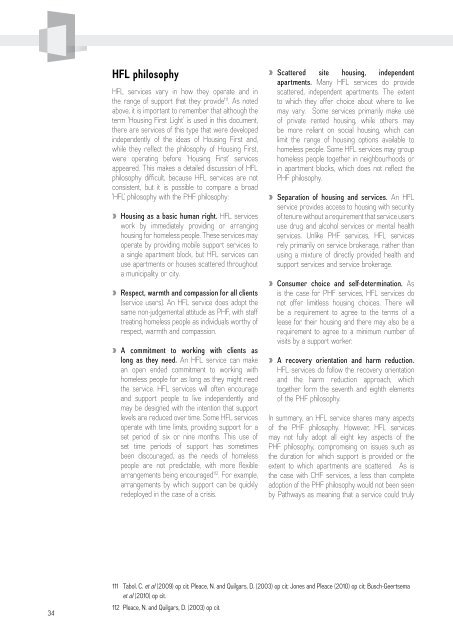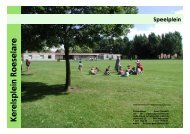Housing First - Provincie West-Vlaanderen
Housing First - Provincie West-Vlaanderen
Housing First - Provincie West-Vlaanderen
You also want an ePaper? Increase the reach of your titles
YUMPU automatically turns print PDFs into web optimized ePapers that Google loves.
HFL philosophyHFL services vary in how they operate and inthe range of support that they provide 111 . As notedabove, it is important to remember that although theterm ‘<strong>Housing</strong> <strong>First</strong> Light’ is used in this document,there are services of this type that were developedindependently of the ideas of <strong>Housing</strong> <strong>First</strong> and,while they reflect the philosophy of <strong>Housing</strong> <strong>First</strong>,were operating before ‘<strong>Housing</strong> <strong>First</strong>’ servicesappeared. This makes a detailed discussion of HFLphilosophy difficult, because HFL services are notconsistent, but it is possible to compare a broad‘HFL’ philosophy with the PHF philosophy:❱❱<strong>Housing</strong> as a basic human right. HFL serviceswork by immediately providing or arranginghousing for homeless people. These services mayoperate by providing mobile support services toa single apartment block, but HFL services canuse apartments or houses scattered throughouta municipality or city.❱❱Respect, warmth and compassion for all clients(service users). An HFL service does adopt thesame non-judgemental attitude as PHF, with stafftreating homeless people as individuals worthy ofrespect, warmth and compassion.❱❱A commitment to working with clients aslong as they need. An HFL service can makean open ended commitment to working withhomeless people for as long as they might needthe service. HFL services will often encourageand support people to live independently andmay be designed with the intention that supportlevels are reduced over time. Some HFL servicesoperate with time limits, providing support for aset period of six or nine months. This use ofset time periods of support has sometimesbeen discouraged, as the needs of homelesspeople are not predictable, with more flexiblearrangements being encouraged 112 . For example,arrangements by which support can be quicklyredeployed in the case of a crisis.❱❱Scattered site housing, independentapartments. Many HFL services do providescattered, independent apartments. The extentto which they offer choice about where to livemay vary. Some services primarily make useof private rented housing, while others maybe more reliant on social housing, which canlimit the range of housing options available tohomeless people. Some HFL services may grouphomeless people together in neighbourhoods orin apartment blocks, which does not reflect thePHF philosophy.❱❱Separation of housing and services. An HFLservice provides access to housing with securityof tenure without a requirement that service usersuse drug and alcohol services or mental healthservices. Unlike PHF services, HFL servicesrely primarily on service brokerage, rather thanusing a mixture of directly provided health andsupport services and service brokerage.❱❱Consumer choice and self-determination. Asis the case for PHF services, HFL services donot offer limitless housing choices. There willbe a requirement to agree to the terms of alease for their housing and there may also be arequirement to agree to a minimum number ofvisits by a support worker.❱❱A recovery orientation and harm reduction.HFL services do follow the recovery orientationand the harm reduction approach, whichtogether form the seventh and eighth elementsof the PHF philosophy.In summary, an HFL service shares many aspectsof the PHF philosophy. However, HFL servicesmay not fully adopt all eight key aspects of thePHF philosophy, compromising on issues such asthe duration for which support is provided or theextent to which apartments are scattered. As isthe case with CHF services, a less than completeadoption of the PHF philosophy would not been seenby Pathways as meaning that a service could truly34111 Tabol, C. et al (2009) op cit; Pleace, N. and Quilgars, D. (2003) op cit; Jones and Pleace (2010) op cit; Busch-Geertsemaet al (2010) op cit.112 Pleace, N. and Quilgars, D. (2003) op cit.
















